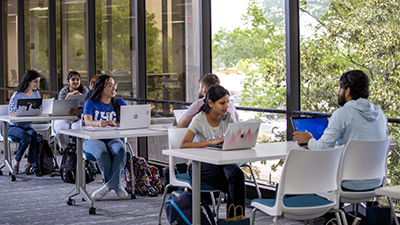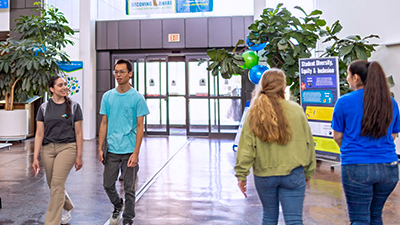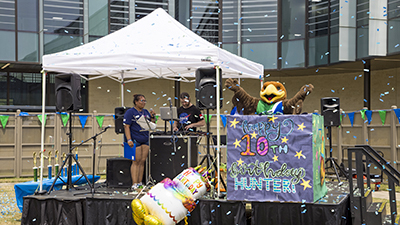Good communication is key to help teachers, parents with kids struggling behaviorally
For some young children, the transition from home to the structure of a school environment can be a tough one. Tori Fletcher, a third-year graduate student pursing her Master of Arts in Behavior Analysis at University of Houston-Clear Lake, is interested in working with children who have severe problem behavior and helping parents and teachers identify and stop problem behavior before it starts.
“My strategies are geared toward small children who don’t yet have a history of problem behavior,” Fletcher said. “These methods can apply to any child, whether he has a disability or not.”
She said that good communication skills were the best place to start with parents and teachers. “Problem behavior serves a purpose for the child,” she said. “Typically, it’s because they can’t appropriately communicate what they want or need so engage in the problem behavior.”
For example, Fletcher said that if a young child can be taught to ask appropriately for a break, or for food, attention or toys, then they could be less likely to engage in disruptive behavior. “If you’d like a child to ask for attention, you could prompt him by giving him the correct words to use to ask for it,” she said. “If you’re busy, you could teach the child to say, ‘excuse me.’ If they look for attention inappropriately, you would only provide attention for an appropriate request.”
Later, she said, you can add delays. “Once they know how to ask, you can decide that you won’t necessarily give them what they want every time they ask,” she said. “One of the skills is learning how to wait for things, or how to tolerate being told ‘no.’ You can offer alternatives like, ‘You can’t have this now, but you can have that.’ And teach them if they wait for an item, they can have it back.”
Accepting ‘no’ for an answer is a big issue with children exhibiting problem behavior, Fletcher explained. “Another situation that evokes a lot of problem behavior is getting a child to do work, whether it’s academic tasks at school or chores at home,” she said. “My strategies involve ways to make those things more tolerable or even fun. When a child is sitting down to do work, sometimes the parent or teacher wants them to work for a long time with no breaks, which makes it difficult. That’s why frequent breaks are useful, and a lot of praise and rewards for doing work.”
Fletcher said that upon her graduation from UH-Clear Lake, she hopes to work with children or adults exhibiting severe problem behavior. She said that she became interested in becoming a Behavior Analyst Certification Board-certified behavior analyst when, as an undergraduate psychology student at another university, she heard a behavior analyst speak to her class. “I thought it would be rewarding to teach new behaviors and skills to kids with autism and work with challenging behavior in general,” she said. “I hope to work in a clinic or hospital setting.”
As part of the Center for Autism and Developmental Disabilities Speaker Series, Fletcher will discuss reinforcement-based strategies in a presentation entitled “How to Prevent Problem Behavior Before it Starts” on Feb. 15 at 10:30 a.m. in the Garden Room of the Bayou Building at UHCL.
Register online for one or more of the CADD Speaker Series events.







